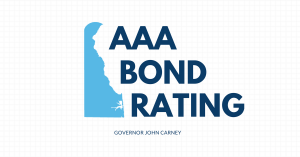All three major credit rating agencies award Delaware with ‘AAA’ bond rating
WILMINGTON, Del. – All three major credit rating agencies have once again awarded Delaware with a ‘AAA’ rating, citing the state’s ongoing commitment to strong fiscal management. With this endorsement, Moody’s Investors Service, Fitch Ratings, and Standard & Poor’s Global Ratings have favorably acknowledged the current administration’s efforts to balance the state’s budget, make difficult cost cutting decisions, and develop new ways to raise revenue.
“Delawareans expect us to responsibly manage taxpayer dollars, and these ratings reaffirm that we are committed to doing just that,” said Governor John Carney. “We remain focused on building a sustainable financial plan, operating efficiently, and making important investments in education, our economy, and other services that make Delaware an even better place to live, work, and raise a family.”
The ratings agencies noted that Delaware has a strong government framework and provides frequent updates to revenue forecasts. This sets the stage for the state’s ability to proactively manage its budget, and respond to fluctuations in the economy – resulting in what they referred to as the state’s exceptional financial resilience.
Delaware officials worked quickly with financial advisors and bankers over the last two weeks to respond to proposed tax policy changes under consideration by Congress. The State disclosed, structured, marketed and closed $115 million of advance refunding bonds in record time, ensuring that state taxpayers did not miss out on a $4.7 million savings opportunity created by this refinancing.
“Positive credit ratings ultimately translate into long-term savings for Delawareans,” said Rick Geisenberger, Secretary of the Delaware Department of Finance. “In this case, our ability to move quickly to adapt to rapidly changing market conditions will also create near-term savings that will free up funds to invest in growing our economy and improving the lives of Delaware citizens.”
###

